How Would It Feel to Plan Your Day for Once?
Over the last few months, I’ve had conversations with farmers, elevators, and drivers who are constantly trying to navigate that First Mile of their supply chain.
I’m hearing a lot of the same pain points… and a lot of variable ones that are unique to the location, farm, or supply chain. When I put everything up on the wall and draw out the lists, these participants are commonly beholden to another person in the supply chain. Sometimes it’s a question of where trucks are and the lines at the elevator. Sometimes it’s the elevator operator who closes early because he or she doesn’t know that a farmer is planning to drive a truck load 20 miles after dinner hours.
A common theme is that everyone in the supply chain must react to the actions of everyone else. Harvest is typically a reactive event – where things out of your control play a major role in the decisions that you make on the farm.
FOB aims to eliminate the frustration, downtime, and misallocated resources that go into a reactive business model.
By bringing transparency, collaboration, and improved communication to that First and Last Mile, FOB aims to make agriculture more proactive, which fundamentally provides its own benefits to any business.
What Does Being Proactive Mean for Supply Chains?
Being reactive is the management of risk AFTER it has become a threat.
Being proactive is a critical element in managing risk BEFORE that risk becomes a threat.
My expectation is that a more proactive supply chain will provide the following benefits.
- The ability to have a plan ahead of harvest that enables efficient use of farming assets and adherence to that plan by all team members
- Ensuring that all of your vehicles are prepared for transport
- Knowing where exactly all of your freight verification documents are and having them in one place
- Having access and knowing that trucks are available to come pick up freight
- Knowing ahead of time if it will be better for you to drive your freight or hiring a driver and having a specific drop off time set for your grain loads.
- Making sure that your trucks are back in time before the grain carts and combine are full.
This is just a starting point based on the common challenges I’ve heard in recent months. But FOB will take on new challenges as well, particularly those that are unique to an individual operation.
Challenge by challenge, FOB will improve predictability by reducing the volatility and variability in daily freight operations.
I recognize that participants will still need to be reactive in certain situations. You’ll always require audibles, but when that audible needs to occur, everyone is on the same page when communication is easy and clear.
Find out what FOB can do for your operations. Schedule a Demo with us today, and let’s determine how this application can help ahead of the upcoming harvest season.

